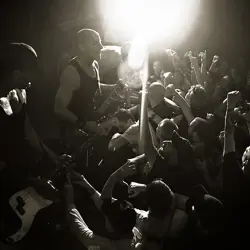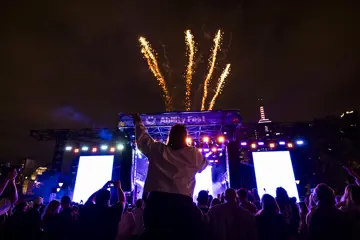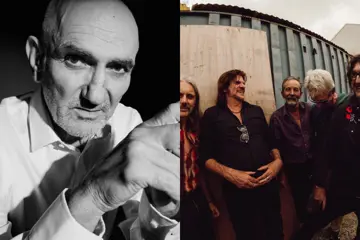 Youth Of Today
Youth Of TodayYouth Of Today are more than just another East Coast hardcore band. With their cry for positivity and strong support for drug and cruelty free living the unassuming quartet started a worldwide movement. The Youth Crew era, as it would become known, was not universally welcomed by all. Many veterans of the New York hardcore scene saw the movement as alien to the genre's founding values. When Youth Crew hit in 1988, nihilism and inner city poverty was replaced by sunshine bright positivity and healthy living. Even more importantly, floods of relatively well-heeled kids from the suburbs entered the scene. Gone were mohawks, leather jackets and chains. In their place, Nikes, crew cuts and collegiate jackets. Drum asked Cappo whether such a stark juxtaposition is justified or simply glib.
“It's an interesting question,” he says. “Before the Youth Crew scene there were very few people who actually lived right in New York City. A lot of the kids came from other places and called themselves 'New York City'. But I will say what [hardcore] attracted in the old days was runaways – disenfranchised kids living on the streets, and not always from poor families – it was mixed. As for Youth Crew, the same aggression was there as was in the older hardcore scene, but the message of positivity and respect resonated with a group of kids who came from generally stable and happy families. They weren't ready at age 14 to say, 'I'm going to run away from mum and dad'. Most of us loved our parents. What Youth Crew did was make accessible this intense form of music to kids who weren't interested in the hardcore drug scene that was such an integral part of say the punk scene of New York in 1982.”
While Cappo is keen to emphasise that the Youth Crew worldview was a positive one, there is no doubt that the straight edge ethos of the scene slowly changed from one where healthy living was vocally encouraged to what some would consider a militant cult – an us vs them myopia.
“Although I was out of it by then the militancy did eventually become harmful to the message,” agrees Cappo. “I thought it became ridiculous. By the time the third Youth Of Today record came out I realised that this thing was a self propelling, potentially problematic thing – when people just run with a couple of ideas and think they are perfected beings. I always had this idea of self-improvement, and integral to that is the concept of 'self'. To me it wasn't about changing the world per se but the bigger change was changing yourself. When it became a 'me against them' sort of thing, I felt that it had missed the point. To me straight edge pitted 'myself' against my own lower nature – not against anyone else. I've always believed that you set an example by living an inspirational life – and that's how you can change society – not forcing other people to your will. And you can trace that attitude in the songs I wrote. I think some people ran with straight edge and in the name of self-betterment it became intertwined with arrogance. It doesn't matter whether it's health food or religion – once it's intertwined with arrogance the whole thing is corrupt. The ethos was always at its most powerful when it was leveraged with humility and a deep concern for other people.”
So what was more important to you – the music or the message?
Don't miss a beat with our FREE daily newsletter
“To perfecting the band was a happy blend of both those things,” answers Cappo. “If the music was bad – who cared what you were saying. And on the other hand, if the music was good but the lyrics were really negative – I didn't want to listen to it.”
One interesting thing to come out of the hardcore movement of the late 1980s, particularly in New York City, was a fascination with the Hare Krishnas. Aside from Cappo himself, the likes of John Joseph and Harley Flanagan from the Cro-Mags and Keith Burkhardt from Cause of Alarm would all become vocal adherents of the faith. At one point there was even a so-called 'Krishnacore' movement of bands like Cappos' Shelter, 108, Prema and Refuse To Fall, all staffed by full-on Krishna devotees. So how the hell did hardcore kids become intertwined with what must have been viewed as a very alien belief system?
“I get that question a lot from people who just don't get the connection,” laughs Cappo. “Before I answer the question I should point out that something like 60 per cent of Hindus worship Krishna – so despite what some in the West think, it's not a marginalised cult at all. As for how the connection happened – well devotees of an Indian guru who had come to the States in the 1960s happened to have a temple on the Lower East Side of New York City. Part of their tradition was to hand out free food to people – and of course who came up to them, a bunch of homeless punk kids. I think the belief system was far out enough that punk and hardcore kids could relate to it. For a lot of kids in the hardcore scene, Krishna consciousness, which is a very complete belief system where vegetarianism is at its core, filled a need that the religions they had grown up with didn't. It was also very inclusive – so that attracted people. I guess the fact that influential people in the scene were touched by it also probably helped spread the lifestyle and belief system.”
Presently Youth Of Today are in semi-retirement. Although reforming sporadically to play gigs over the year all the members have other things going on in their lives. So why come to Australia to play Hardcore 2013?
“These days we play because we want to,” reveals Cappo. “Mainly we choose to go to places we never got a chance to go to before – like Russia and now Australia. Other places like South-East Asia didn't have fully developed scenes then so we couldn't go there – but now we can.”
“It's amazing that we finally have the chance to play in Australia. We're going to try and play some songs off all the records we did because we know most people won't have seen us before. But I'll also say this – if the mood takes us we'll do some requests from audience. So if there's something you really want to hear shout it out when you come to the show and you never know – we may just play it!”















